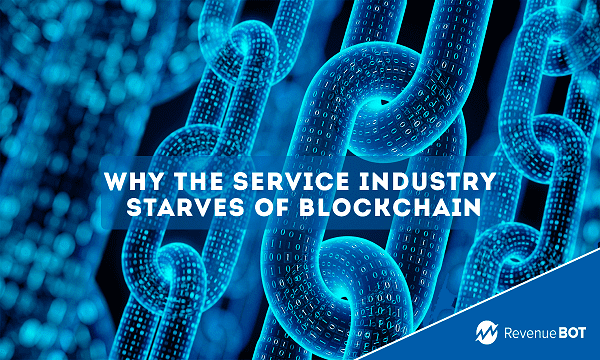
With the rapid advancement of technology in the present-day world, blockchain adoption stands one of the most hotly debated and promising trends across various industries. The service industry is one such. In this article, we will delve into why blockchain is not just a buzzword, but rather an integral element in the evolution of this very sector.

The need for blckchain
In a service industry where each and every transaction, exchange of information and even the slightest alteration of data is critical, such a technology is coming to the forefront as an indispensable component of high efficiency and security. Let us break down why the services sector is looking for this innovative approach.
- Transparency and trustworthiness: Within the world where interactions between customers and vendors are centered around trust, blockchain acts as a reliable intermediary. This technology builds an unmodifiable chain of blocks, each of which stores transaction info. Thus, it ensures full transparency of all procedures and eradicates the risk of data manipulation.
- Ultra-tight data safety: Cybersecurity is gaining high priority as the storage and transmission of sensitive information collides with threats. So blockchain, which uses cryptography to provide better security, creates a resilient system, eliminating the risks of data breaches and unauthorized access.
- Maximum workflow efficiency: Thanks to the smart contract, a program code executed automatically under certain conditions, blockchain alleviates the need for mediators and streamlines business processes. Not only does this cut costs, but it also boosts the overall perfomance.
The role of blockchain in medical records management
Among the key issues in healthcare is the security of medical records. Blockchain provides cryptographically protected chains of blocks, where each block contains information about a specific medical transaction. By doing so, it creates an immutable log that is foolproof and secure from tampering.

The decentralized nature of blockchain allows various participants in healthcare such as hospitals, laboratories and insurance companies to share data on-line. This leads to increased coordination and improved medical service.
Through blockchain, patients enjoy greater control over their medical data. By utilizing smart contracts, patients can grant access to their records only to healthcare providers they trust, thereby ensuring privacy and compliance with data protection laws.
Documenting healthcare services via blockchain makes insurance claims processing more visible and efficient. What’s more, this mitigates the risk of mistakes and speeds up the workflow.
What about the hospitality industry?
The hotel industry, the embodiment of comfort and service, is also being impacted by technological innovation, so blockchain does not remain on the sidelines here either. Take a look at how this framework is redefining standards here in the lodging industry.

Implementing blockchain into hotel management systems allows for the creation of secure guest identification. Smart contracts as usual can provide automated room access, payment management and additional services, whilst optimizing the risks associated with tampering or lost keys.
Blockchain helps enable a decentralized room booking system, addressing middleware vulnerabilities and decreasing costs. This also offers transparency and a fair environment for all the visitors.
This technology allows hotels to build token-based loyalty programs. This attracts regular customers and delivers personalized services based on guests’ previous stays.
Moreover, it provides high transparency in supply chain management, tracking all shipments from food and beverages to cleaning essentials. As a result, both the quality of service is elevated and safety standards are upheld.
Through cryptocurrency payments and smart contracts, hotels can ease the payment process for customers and provide financial transparency for both parties.
Blockchain applications in legal transactions
Legal transactions, especially involving real estate, are often fraught with risks and complicated paperwork.
But when it comes to blockchain, it enables a decentralized property registration system that ensures immunity to fraud. The entire ownership history is stored on the blockchain, which greatly simplifies verification processes during real estate transactions.

By the same way, it can help in choosing a car, where you can see all the details about its previous owners and performance history as clearly as on paper.
Conclusion
In the services industry, blockchain has paved the way for transparency, security and efficiency. In the hospitality sector, it introduces fresh standards in the areas of B2C and loyalty. As for legal and real estate transactions, blockchain is evolving into a cornerstone.
This technology not only streamlines the overall workflow, but also reshapes the landscape of traditional industries, making them affordable and open to everyone. Given the constant expansion of such a thing, we can only anticipate the new perspectives and opportunities it will bring in the years to come.
